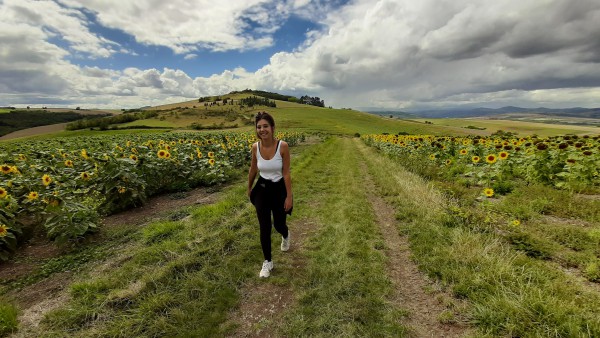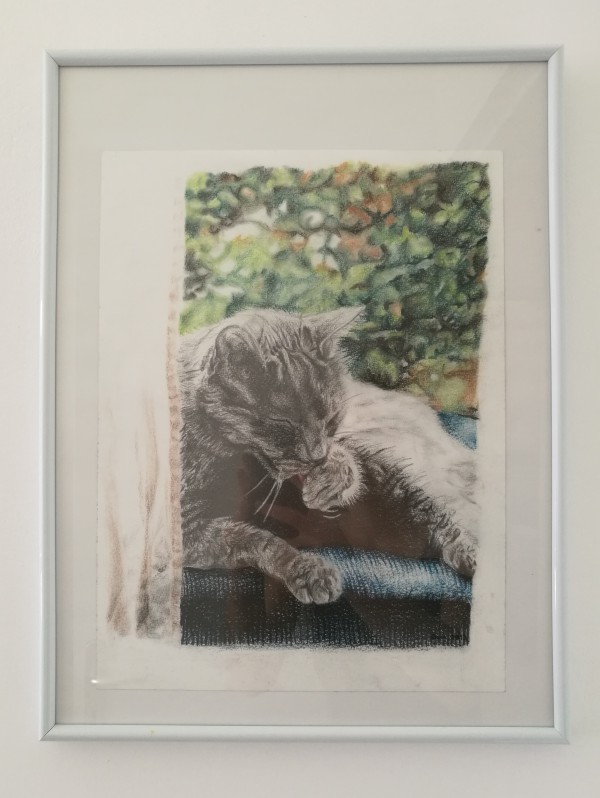Dune André
Interview by Carey Sargent, EPFL, NCCR MARVEL
Were you always interested in science?
In France, we started physic and chemistry classes in middle school and I remember that after my first class, I said physics is incomprehensible and uninteresting, I really didn’t like it. So my first impression was not positive. Year after year though I was less disgusted, I was never really interested in it. I preferred fields that were closer to humanity like literature and history. Later in high school I felt interested in biology. That was the scientific field that I liked the most so I began university in biology. I had to take some chemistry classes in university and at this moment, I started to realize that physic and chemistry were around me, I could relate it to my environment and me as a human. At this moment, I really felt interested in physics as I realized that it could explain reality, even things that I cannot see, and that it’s not just studying abstract phenomena and abstract systems. That was the beginning of my interest in physics.

How did you hear about the INSPIRE Potentials Program?
I did a two-month internship in France at ENS about theoretical chemistry, more particularly quantum chemistry, in summer 2019. For our Master’s degree, we have to do a longer internship abroad, so I told my supervisor that I wanted to continue in theoretical chemistry, but more applied, in particular to materials. He and the Head of my Chemistry department received an email about the MARVEL INSPIRE Potentials fellowship and they thought of me as the involved labs of the Program are working on computational chemistry applied to materials. They told me about this opportunity and helped me apply for it.
What was your master’s project on?
It was on the field of molecular electronics in which we study organic molecules for potential electronic applications instead of silicon-based electronics. The field is typically divided into two types of systems: the single-molecule systems and the molecular materials called organic semiconductors. For both of these systems, π-conjugated molecules are mostly studied because they are conductive and they have good properties for electronic applications. But recently Clémence and a postdoc Ganna Gryn’ova demonstrated that a new class of saturated molecules could have high charge transmission in single-molecule junctions. These are one-dimensional saturated hydrocarbon wires, called carbon nanothreads. My project was to transfer the study of these molecules with potentiality for single-molecule junctions to the study of organic semiconductors. I studied in silico hole transport in several carbon nanothreads with different topologies and compared them to more simple saturated molecules. I also considered the effect of adding heteroatoms in carbon nanothreads by replacing carbons by nitrogens.
What did you like best about the INSPIRE program?
My internship was a bit strange because I only spent three weeks in Switzerland and then I had to work from home because of Covid and so my opinion is probably not objective as the situation really impacted it. But I can say that the program was firstly a motivation to think that I belonged to a project for women in science. It was also good that there was a selection of labs at the beginning and so I could easily find which lab was the most interesting for me and then it is easy to apply to the selected lab. With the program we also feel supported, for example with a mentor. I couldn’t really experience that because I wasn’t there in the lab, but I think that it’s a big advantage with this program, we are well supported. Even if I had to work from home, I knew that the INSPIRE program was still there for me and so it was a moral support.

Dune's drawing of her cat, Patchouli.
Do women face specific challenges in the sciences?
I never had to face any particular challenge myself, but I just experienced studying sciences, not permanently working in it. Maybe looking for a permanent post makes you more susceptible to facing challenges. I have always been surrounded by women, by women professors, even the head of the Chemistry Dept. in ENS is a woman. I don’t see being a woman as a difficulty where I am, but maybe there are some challenges and I’m just too fixed in my mind and I can’t see them! This is another issue maybe more underlying. I think things are getting better and improving—even the Nobel Prize in Chemistry was just won by two women. We must not forget though that this was not the case before and that it was exclusively men working in sciences – or rather only men were promoted. I think progress now would be not even needing to think about the gender anymore, meaning having women in science is something totally usual. That would be progress, to get to a point where we don’t even notice if the scientist is a woman or a man.
Any advice for young girls interested in the field?
This is more global advice for any field, even if the girls want to be a scientist or not. I would say that you should do what you want to do and not let people intimidate you. This is not particular to science, but don’t let people tell you that you are not able to do it. What is also important is that even if you have a goal at the beginning of your studies, if you have a plan, sometimes you want to keep at it, and don’t take the time to ask if that’s what you really want to do and what you’re interested in. It’s not a failure to change plans. You should always be open to interests you discover on your way and you can deviate from your initial plan. I think this is particularly affecting girls, we can have the impression that we have to prove that we are capable of doing long studies and having ambitious plans, and in this context, changing our plans could be interpreted as a failure but it is not at all, it is just meaning that we grow up.
What are your plans for the future?
I want to be a researcher in a public university. I want to do a PhD but I’m not sure that I still want to do full computational research. This year I am studying chemistry for cultural heritage, it means using chemistry and physics to analyse old materials and art materials in order to preserve them but also working like an investigator trying to know the chemical history of the materials and their cultural history through chemistry. I think that I want to insert my chemistry research in an historic and cultural context, I want to relate my work to what I really like, which is art and history. This is something I learned through my internship—the context of my research is also important for me.
